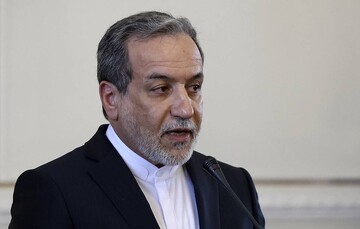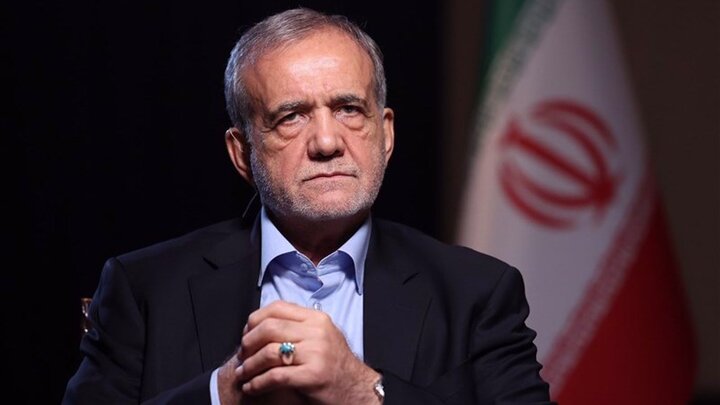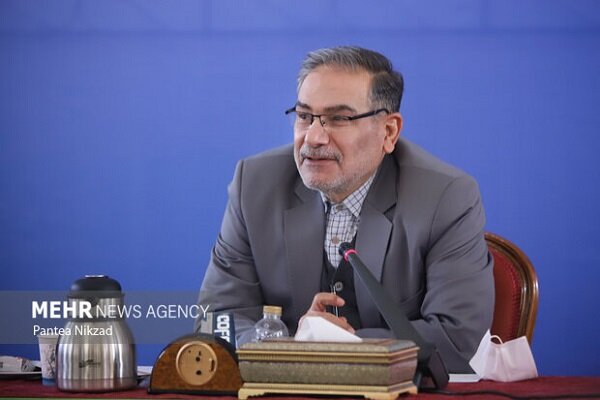
TEHRAN, (MNA) – Iranian officials have time and again stressed that Washington must understand that the Islamic Republic will not retreat from its legal rights under any pressure—be it threats, sanctions, or economic warfare.
In recent years, the United States has repeatedly proven that it is not only untrustworthy when it comes to international agreements but also that it uses hostile policies and unjust sanctions to exert pressure on Iran. From its unilateral withdrawal from the JCPOA and violation of international commitments to military threats and overt aggression, Washington has continuously attempted to force Iran into submission. However, the Islamic Republic of Iran has repeatedly demonstrated that it will never surrender to foreign pressures and will not back down from its legal rights. If the US seeks an agreement, it must accept that respecting the rights of the Iranian nation is the only path to a diplomatic solution.
The JCPOA: An agreement US unilaterally withdrew from

The JCPOA, a deal reached after years of negotiations between Iran and world powers, proved that Iran has no issue with constructive and transparent engagement. However, it was the United States that unilaterally withdrew from the agreement in 2018 under president Trump's administration, breaking all its commitments. This move demonstrated that the US does not adhere to any agreement unless it serves its own interests.
While Iran fully complied with its obligations under the JCPOA, Washington, with its coercive policies, reinstated sanctions and sought to use economic pressure to force Iran into submission. Yet, rather than giving in, Tehran took compensatory steps to reduce its JCPOA commitments, proving that it stands firm against hegemonic policies.
Exchange of messages between Washington and Tehran
After leaving the JCPOA, the Trump administration pursued a maximum pressure policy aimed at crippling Iran. However, this policy, designed to bring Iran to its knees, ultimately failed and only deepened mistrust toward the US. Continuous threats, crippling sanctions, the assassination of senior Iranian figures, and support for rebel groups were only a few examples of Washington’s hostile actions against Tehran.
Yet, Iran has never backed down in the face of threats. Iranian officials have repeatedly emphasized that if the US seeks negotiations, it must learn to speak to the Iranian nation with respect, not threats.

In early March, US President Donald Trump said that he had sent a letter to Tehran, saying he hoped Iran would agree to hold talks.
Trump claimed he wanted to negotiate a nuclear deal with Iran and sent a letter to its leadership. "I said I hope you're going to negotiate, because it's going to be a lot better for Iran," Trump claimed in the interview with Fox Business Network broadcast.
Several days later, Anwar Gargash, Diplomatic Advisor to the President of the United Arab Emirates, and his accompanying Emirati delegation, handed over Trump's letter to Iran in a meeting with the Iranian Foreign Minister Abbas Araghchi. The text of Trump's letter has not been disclosed as of yet.
A day after receiving the letter from the Emirati delegation, Araghchi stressed that Tehran will not enter direct talks with the US unless Washington guarantees talks free from threats. The top Iranian diplomat reiterated Tehran's will to negotiate under principles of 'honor, wisdom, expediency. '

On March 28, the top Iranian diplomat said that the Islamic Republic has sent its response to the letter of the US President Donald Trump via Oman. He reaffirmed Iran’s firm policy of refusing direct negotiations under maximum pressure and military threats, emphasizing that while direct talks are off the table, indirect negotiations—similar to those conducted under previous administrations—can continue.
Meanwhile, in a phone conversation with his British counterpart David Lammy shortly after Iran responded to a US letter, Araghchi reiterated Tehran's willingness to engage diplomatically regarding its peaceful nuclear program but emphasized that direct talks under "maximum pressure" and "military threats" are meaningless.

Commenting on the developments on March 30, Iranian President Masoud Pezeshkian confirmed that the door to holding indirect talks with Washington remains open.
He clarified that while Iran has explicitly rejected the possibility of direct negotiations with the United States, the option of indirect talks remains on the table.
"As we have stated before, Iran has never closed the channels of indirect communication. In its response, Iran reaffirmed that it does not avoid negotiations, but rather, it has just been the United States' repeated violations of agreements and commitments that have created obstacles in this path."
He stressed that if the US seeks to restore negotiations, it must first rebuild trust by rectifying past breaches, adding that it is the Americans' approach that determines the continuation of the negotiation path.

Meanwhile, Ali Shamkhani, senior advisor to the Leader of the Islamic Revolution, emphasized that the US has consistently pursued a multi-layered strategy against Iran since the 1979 Islamic Revolution.
“Since the beginning of the Islamic Revolution, the US. has used a combined package against Iran, including military threats, psychological warfare, interference in Iran’s internal affairs, and mobilizing so-called allies against us. This is nothing new,” he said.
He stressed that Iran is fully aware of this approach and does not consider it an unexpected tactic.
Shamkhani underlined Iran’s resilience in the face of external pressure, stating that the nation will never bow to threats.
Shamkhani further clarified that Iran has long engaged in indirect dialogues with the US, and this letter reiterated Tehran’s readiness for such discussions under specific conditions.
“Iran has always conducted indirect talks with the US. This letter reaffirmed that Iran is prepared for indirect negotiations, but only if the discussions are based on equal footing. If that condition is met, further steps toward dialogue could be taken.”
US chooses threats over diplomacy

On the very same day on which Iran expressed its readiness to engage in indirect talks with the US, Donald Trump took a hostile position and warned of bombings and renewed sanctions against Iran, showing Washington’s preference for threats over diplomacy.
In a phone interview with NBC News on Sunday, Trump confirmed that American and Iranian officials had been in contact but refused to provide any details. Instead, he issued a hostile threat: "If they don't make a deal, there will be bombing."
He further warned that if negotiations failed, he would reinstate secondary sanctions similar to those imposed four years ago.
Trump's threats brought strong reactions from high-ranking Iranian officials:

Leader of the Islamic Revolution Ayatollah Seyyed Ali Khamenei has stressed that if the enemies commit any evil act against Iran, they will definitely receive a strong and reciprocal response.
Ayatollah Seyyed Ali Khamenei made the remarks in a speech at the Grand Mosalla mosque of Tehran where he led this year’s Eid al-Fitr prayers.
He stressed that if enemies commit evil against Iran, they will definitely receive a strong and reciprocal blow. "And if they seek to create sedition within the country, the (Iranian) nation itself will (give a proper) answer to them."
Iran's position remains the same as the enmity of the US against Iran remains the same too, he underlined.

"An open threat of «bombing» by a Head of State against Iran is a shocking _affront_ to the very essence of International Peace and Security," Iranian Foreign Ministry Spokesman Esmaeil Baghaei wrote on X.
"It violates the United Nations Charter and betrays the Safeguards under the IAEA."
"Violence breeds violence, peace begets peace. The US can choose the course...; and concede to CONSEQUENCES…," he stressed.

Brigadier General Amir Ali Hajizadeh, commander of the IRGC’s Aerospace Division, warned that the US forces in the region are sitting in a “glass house” and should avoid “throwing stones at others.”
“The Americans have 10 [military] bases in the region, particularly around Iran, and 50,000 troops based in there,” Hajizadeh said.
“This means they are sitting in a glass house; and when one sits in a glass house, one does not throw stones at others.”
Iran’s options in the event of a US military attack
If the US contemplates military action, it must understand that Iran will not remain idle. The Islamic Republic, with its military power, missile capabilities, regional presence, and allies, has multiple options to respond to any aggression. It can't be also ruled out that Iran may close the Straight of Hormuz in that case.

Islamic Revolutionary Guard Corps (IRGC) Navy Commander Rear Admiral Alireza Tangsiri reaffirmed Iran’s military capabilities, warned against threats, and rejected any negotiations on its missile arsenals.
IRGC Navy Commander Admiral Alireza Tangsiri made strong remarks regarding Iran’s defensive posture, emphasizing that any attack on Iran will be met with a decisive response.
Tangsiri categorically rejected any possibility of Iran engaging in negotiations over its missile arsenal or support for Resistance groups.
"Iran will never negotiate over its missiles or the capabilities of the Resistance Front."
He clarified that Iran seeks peaceful relations with its neighbors, assuring that Tehran does not pose a threat to other regional nations.
"We always extend a hand of friendship to the countries in the region. As Muslims, we do not pose any threat to our neighboring countries," he emphasized.
While stating that Iran has no intention of initiating war, Tangsiri stressed that any attack on Iranian interests or its people will be met with a firm response.
"We do not seek war and do not wish for it. However, if the enemy tries to harm our interests or attack our people, they must know that we will respond."
Regarding the possibility of blocking the Strait of Hormuz, Tangsiri clarified that while the decision lies with high-ranking officials, his forces would be responsible for carrying out such an order if given.
"Deciding whether to close the Strait of Hormuz is not my responsibility—it is in the hands of senior officials. However, if ordered, its execution is my duty."
Tangsiri stated that Iran possesses the capability to strike enemy bases anywhere, adding that any location from which an attack is launched on Iran will be targeted in return.
"We have the capability to strike all enemy bases, wherever they may be. If an attack is launched against us from any geographical location, we will strike back at that exact place."
"No one can strike us and escape. Even if we have to chase them to the Gulf of Mexico, we would," he added.
In his final remarks, Tangsiri made it clear that Iran will not bow to pressure or threats. "We will not allow Trump to impose his will on us."
Iran has demonstrated that if threatened, its response will be swift, decisive, and regret-inducing.
Iran’s nuclear program: Peaceful and legal
Despite baseless Western claims, Iran’s nuclear program has always been under the supervision of the International Atomic Energy Agency (IAEA) and is entirely peaceful. While the Zionist regime possesses hundreds of nuclear warheads and is not even a signatory to the NPT, the US falsely claims that Iran’s nuclear activities threaten global peace.
The Islamic Republic of Iran asserts that the peaceful use of nuclear energy is the inalienable right of every nation.
It says that all of its nuclear activities are transparent and under international oversight, and the US is merely using excuses to exert further pressure on Iran.
Iran has repeatedly stated that if Washington seeks an agreement, it must respect Iran’s rights and abandon its hegemonic policies.
What is clear is that US policies toward Iran are based on delusion and arrogance. However, Iranian officials have time and again stressed that Washington must understand that the Islamic Republic will not retreat from its legal rights under any pressure—be it threats, sanctions, or economic warfare.
Reported by Mohaddeseh Pakravan

No comments:
Post a Comment